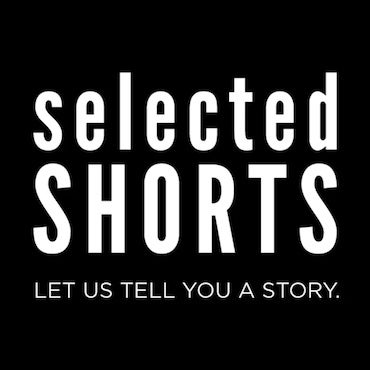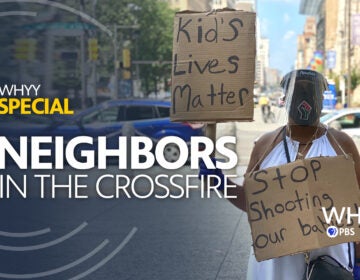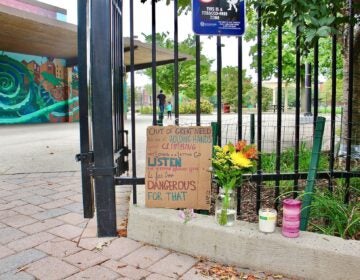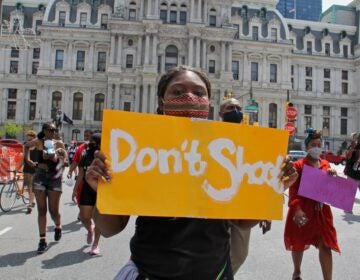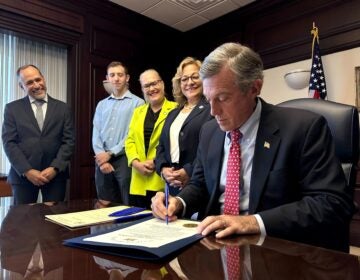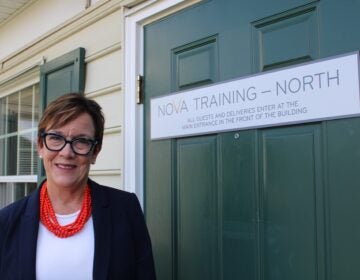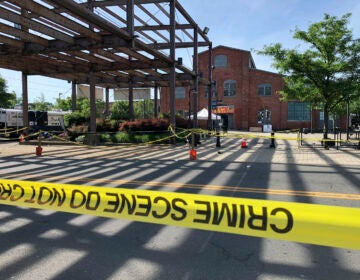Want answers to Philly gun violence? Ask someone who’s lived it
More than 1,500 people have been shot in Philly this year. The city needs answers, and listening to John Solomon's story may be one place to start getting them.
Listen 17:51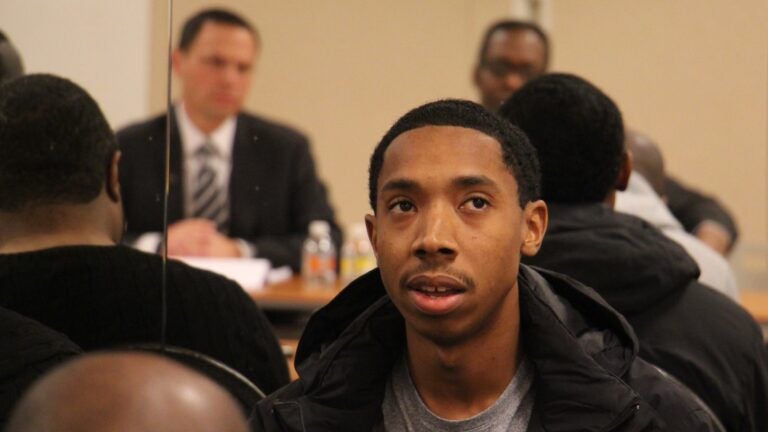
John Solomon talks about his experiences with guns, which began when he was 11 years old and ended with a 5-year prison sentence. He spoke during a community meeting in North Philadelphia with Pennsylvania Attorney General-elect Josh Shapiro in 2016. (Emma Lee/WHYY)
Nearly 1,500 people have been shot in Philadelphia so far this year. Over the past 20 years, the city has tried all kinds of approaches to stop gun violence — policies like broken windows policing and programs with names like Focused Deterrence and now, Group Violence Intervention — but nothing seems to be working.
What are we missing?
John Solomon runs Endangered Kind, a nonprofit dedicated to stopping gun violence. Solomon, 28, has been shot and served time in prison for shooting someone. He says hearing the experiences of young Black men like him is a good place to start getting answers — because he knows how hard it can really be to listen to messages to put the guns down.

Hear the whole story on The Why
Interview highlights
On growing up at 24th and Somerset, known as ‘2-4 Bloodline’
I grew up without a father, but I had my mother who was in my life. She raised me. She was a great, loving, caring mother. Also, I had a grandmother and an aunt. I grew up in a really good household. The challenge is — and this is what I speak about very often — is that no matter how good your household is, when you step outside into an environment like that, everybody is under the same conditions. I wanted to be a doctor growing up. I had dreams and aspirations … but a few different life-changing moments happened.
Around the age of 11 and 12 … I witnessed one guy from my grandmother’s block, which is the block that I grew up on, I heard gunshots and I actually walked up to him and I seen that he was dead. Somebody had killed him. Not too long after that happened, I was actually coming home from school on my way to my grandmother’s block. And there was a friend of mine who was … in a panic and he was running from something. This is around 3:00 in the afternoon when school is let out. I said, like, “What happened?” He told me that my cousin was shot in front of Dobbins High School, which was a block away from the school that I went to. I was in middle school at the time and seeing him lifeless as well. It made me want to — for the first time in my life — I actually wanted to get revenge for that.
On getting shot at the age of 15
I remember that day being kind of quiet … It wasn’t too much traffic around the area as far as cars. I was going to war with a neighborhood that wasn’t too far from where I lived at. What I mean by war, it was a violent war. People were getting shot and killed. In the same year, I lost two friends to gun violence. I actually seen the person, but I didn’t actually think that the person was trying to make an attempt on my life. So as the person got closer and I did begin to open fire and I was shot in my arm, went inside of my chest, not too far from my heart.
On how he wound up in prison
At the age of 18, I was pretty much well-known in my community for being very violent. I was one of the go-to guys that you would call when you have issues … And I was called and I came in, the individual was out there, and opened fire. And now he was shot and I was actually arrested on the scene. And I spent almost five years in prison as a result … Thank God he wound up living, yes, because if he didn’t, I would have spent a lot more time in prison than what I did … Sometimes when you don’t address the situations violently, it could kind of backfire on you. When you’re dealing with certain individuals that are violent as well, because the individual, he had a violent history, so when I was called, that was my first response to try to resolve that issue violently.
On his approach to anti-violence work
Specifically, when it comes to the young black males in inner cities, I felt like we were an endangered kind and that’s where I got the concept from. And I went on to actually develop a whole plan behind it and I started a nonprofit organization. And Endangered Kind is a is a mobile advocacy group aimed at shifting the narrative on gun violence, which is what I’m doing now.
So, my job is to really share the perspective from being a shooter and the challenges that went into putting a gun down and actually doing the right thing. Because the truth is, once you get involved in gun violence and you have people that’s trying to take your life and vice versa, it’s not as simple as society makes it when they tell you that you should stop. I could easily came home and wanted better for myself and built a thriving nonprofit organization and could have got killed because of things that I’ve done in the past. So it’s not it’s not a one-two step when it comes to a stop in gun violence or telling the individual to put the gun down, because the same individual that you tell them to put the gun down may get killed because he doesn’t have a gun on ‘em …
I’m young enough to the point where young people actually will listen to what I’m saying. It’s not that they’re going to change right away. This is a process … It doesn’t happen overnight. It didn’t happen overnight for me. It took me it’s been almost five years in prison for me to wake up.
WHYY is your source for fact-based, in-depth journalism and information. As a nonprofit organization, we rely on financial support from readers like you. Please give today.

